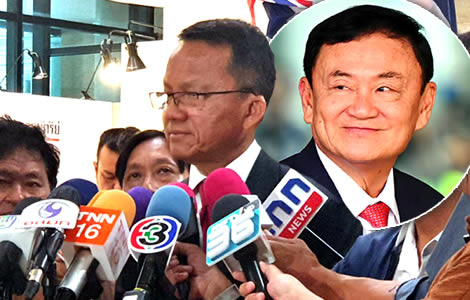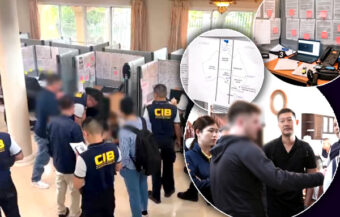Deputy Prime Minister Somsak Thepsutin confirms former Premier Thaksin can serve his sentence at home, citing and approving new regulations. With political divisions deepening, the government faces mounting pressure to resolve the controversy. The saga unfolds against the backdrop of Thaksin’s continued political impact.
The government must soon act on rising tensions relating to the incarceration of former Prime Minister Thaksin Shinawatra. This week, Deputy Prime Minister Somsak Thepsutin strongly defended new regulations which allow for prisoners who do not pose a risk to society to be freed to serve the remainder of their prison terms at home. He bluntly confirmed that Mr Thaksin was eligible for such a dispensation while praising the measure as in line with international standards on human rights.

The ongoing imprisonment of former Thai Prime Minister Thaksin Shinawatra is evolving into a growing political controversy and source of division. It is a rising concern for the government and a potential source of discord in 2024.
He was the country’s dynamic Prime Minister from 2001 until 2006, and as a government leader, served out a full term in power after winning two elections, a first in Thai politics.
His government, led by his Thai Rak Thai Party, won a landslide in the 2005 election.
Coup d’état swept away the dynamism and progress at the heart of Thaksin’s period in power in Thailand from 2001 to 2006. Later convicted by a court
But the September 2006 coup d’état swept it all away following street protests. Then the army moved in for the first coup of the 21st century while Thaksin was away addressing the United Nations.
Since then, Thailand has never quite regained the sense of dynamism and progress. The current government of Srettha Thavisin is trying to recreate the same environment. Unfortunately, the population is older and the economic damage caused by lack of investment since then has been high.
Thaksin Shinawatra fled the country just before the Criminal Court for Misconduct in 2008 convicted him. He subsequently spent 15 years in exile, most of it in the Emirate of Dubai.
His return to Thailand at the end of August coincided with the election of Thai Prime Minister Srettha Thavisin on August 22nd. Both events occurred on the same day, something which many political insiders know was not a coincidence.
Thaksin only lodged in prison for hours on August 22nd when whisked out of the facility due to a medical emergency and taken to Police General Hospital
After a brief court appearance, where a sentence of 8 years was confirmed on him, the former Prime Minister was whisked off to Bangkok Remand Prison. There, he was installed in a hospital wing for observation.
Within hours, however, the ex-premier was taken away in a helicopter reportedly suffering from a hypertensive crisis and taken to the high-spec and luxurious Police General Hospital in the Pathumwan area of Bangkok.
Later, Thaksin received a royal pardon on August 31st. It reduced his 8-year prison sentence to just one year.
Former PM helicoptered to Police Hospital at 3 am after feeling ill says the Department of Corrections
Mr Thaksin suffered a dangerous hypertensive crisis before being transferred by prison authorities
Thaksin’s Eight-year prison term commuted to One by the Thai King in a Royal Gazette bulletin
Since then, he has not emerged publicly from the 14th floor of the hospital. Doctors have continuously certified that he needs specialist medical care, which cannot be provided at the prison where he was lodged on Tuesday, August 22nd.
Speculation of a political grand bargain behind the scenes. Since his imprisonment his youngest daughter Paetongtarn became leader of the ruling party
Since his imprisonment, Mr Thaksin’s youngest daughter, Paetongtarn, has been elected as the leader of the governing Pheu Thai Party and is playing a leading role in the government as the deputy chairman of the Soft Power initiative.
Before and in the days after his arrival in Thailand, the former Prime Minister appears to have had support in the upper echelons of power. Previously, this came from former Deputy Prime Minister Wissanu Krea-ngam, a legal expert and former colleague in government.
Top officials were actively involved in the last-minute negotiations and arrangements to see the former Prime Minister repatriated home.
This was linked to some sort of grand bargain, a secret behind-the-scenes deal. At length, it was designed to produce some sort of national reconciliation after decades of division.
Of course, this stemmed from Thaksin’s successful but tumultuous period as Prime Minister. He was known to sideline red tape and formalities to get things done. People also suspected corruption.
Deputy Prime Minister Somsak Thepsutin is a key figure in the continued controversy surrounding the somewhat unorthodox imprisonment of Mr Thaksin
Certainly, the former Prime Minister is a divisive figure in Thai politics. He continues to be seen in this light.
Over the last few weeks, pressure has been mounting concerning his incarceration at the Police General Hospital. His political foes on the conservative and the establishment side of the political divide called upon officials to investigate the matter.
At the same time, Deputy Prime Minister with responsibility for Security, Mr Somsak Thepsutin, appeared to offer support for Thaksin’s situation. Somsak is another former Thaksin ally and is currently reported to be a member of the Pheu Thai Party.
He is also a veteran minister. Somsak was Minister of Justice in the previous government. In this capacity, he is known to have pushed new regulations allowing inmates to serve time outside of prison facilities.
This week, the new Deputy Prime Minister came forward and made the position clear. With nearly four months of his one-year prison sentence served, Mr Thaksin is now eligible to go home. He can serve the remainder of his sentence outside prison, provided he receives permission from the Corrections Department.
In the meantime, the country’s Democrat Party, in disarray following a damaging leadership contest, is focusing on Thaksin’s Case.
Street protest group the People’s Democratic Reform Committee marches again to confront Thaksin Shinawatra and his obscure treatment as a state prisoner
Opposition to the former Premier rallies political support. In the same way, the previous weeks have seen protesting delegations from the People’s Democratic Reform Committee (PDRC).
The group that launched street protests against his sister Yingluck Shinawatra as PM, in 2013/14 sent deputations to various ministries and the House of Parliament. They sought further investigations into Thaksin’s stay at the Police General Hospital.
Police Chief General Torsak Sukwimol also faces pressure to act. He came forward in recent days making discreet inquiries as to Mr Thaksin’s medical status.
However, this is quite clear. The Corrections Department pointed to Mr Thaksin’s stay at the Police General Hospital was in keeping with regulations. It declined to comment on his medical status out of respect for his privacy and on ethical concerns.
Government must quickly bring an end to Mr Thaksin’s current controversial status. This may mean releasing him to serve the rest of his sentence at home
The government of Srettha Thavisin, in particular the Pheu Thai Party, will be anxious to diffuse the current tensions. Mr Thaksin’s stay in hospital is becoming a focal point for opposition against it.
It is a cause of division which has the potential, if not resolved, to destabilise the government. There are also concerns that there are divisions in the cabinet.
Parties associated with the former government who take up roughly half the ministry portfolios, appear to be pushing their own agenda.
At the same time, Prime Minister Srettha Thavisin, despite his energy and enthusiasm, struggles with the political minutiae of governing.
Constitutional activist Srisuwan is on the case
The case has already drawn the critical eye of Mr Srisuwan Janya, Secretary-general of the Association for the Protection of the Constitution. He announced a lawsuit this week against both the Corrections Department and the Police General Hospital in Bangkok.
Srisuwan’s legal move aims at compelling former PM Thaksin Shinawatra to return to prison and complete his sentence.
He presented his case at the Central Administrative Court on Chaengwattana Road on Tuesday. The lawsuit alleged that the Department of Corrections and the Police General Hospital acted illegally in the matter.
Srisuwan contends that this allowed male prisoners, including Thaksin Shinawatra, to receive treatment outside of prison, a privilege deemed unlawful.
‘We will file a lawsuit against the Director-General of the Department of Corrections and the Chief Medical Officer of the Police Hospital, on the basis of giving authority or discretion illegally and neglecting to perform duties as required by law,’ Mr Srisuwan said at the start of the week. ‘We ask the court to decide and order the Department of Corrections to revoke the regulations allowing inmates to be detained outside prisons in 2023, which unlawfully benefits Mr Thaksin.’
Police Chief appears to be under pressure to make representations. He accepts, however, that it is entirely now a matter from the Corrections Department
It is one of many public challenges to Mr Thaksin’s treatment by the Corrections Department. More and more groups call for his return to prison.
Hours later, Police General Torsak Sukwimol, Commander-in-Chief of the Royal Thai Police, weighed in on December 21, 2023. He noted that Thaksin’s stay at the police hospital is now nearing 120 days of treatment.
Torsak clarified that the Department of Corrections is now the abribiter in deciding the next steps, as the authority of the police has expired.
Police General Torsak made clear however that it was purely a matter for the Corrections Department. ‘The authority of the police has expired,’ he told reporters enquiring about the matter. ‘It is the responsibility of the Department of Corrections to consider.’
Robust defence of new provision which may assist Thaksin to go home. Former Justice Minister and Deputy PM says it is a good measure and appropriate
Responding to the escalating controversy, Deputy Prime Minister for Security, Somsak Thepsuthin, clarified and confirmed new regulations allowing prisoners serve time outside prison.
Somsak, a former Minister of Justice and an ally of Thaksin stated that the regulations were the work of the National Council for Peace and Order (NCPO) or junta government, well before his tenure as Justice Minister.
He defended the law’s international alignment and thinking. He clarified that it applied to prisoners meeting specific criteria. This includes a sentence of less than four years and that the prisoner poses no threat to society.
He bluntly confronted the situation. ‘Now that’s a good thing. There is an example in the case of a former prime minister who is in detention.’
Somsak emphatically asserted that Thaksin met these criteria.
The deputy prime minister emphasised that the law evolved independently of his political affiliation.
Furthermore, he dismissed claims about him joining the Pheu Thai Party for mutual benefit and called for public understanding. Lastly, he underlined that the Department of Corrections does not wield more power than the court.
‘The Department of Corrections does not have greater power than the court,’ he explained.
Corrections Department chimes with Mr Somsak
Subsequently, the Department of Corrections echoed Somsak’s stance. It confirmed Thaksin’s stay in the hospital beyond 120 days was in order, based on medical considerations. Sahakarn Petchanarin, Director-General of the Department of Corrections, emphasised the necessity of continuous treatment.
He cited the absence of a specified time frame for extensions beyond 120 days. He refrained from disclosing Thaksin’s medical details, citing legal and ethical constraints.
The intricacies of Thaksin’s return to Thailand in August 2023, coincided with Prime Minister Srettha Thavisin’s election. It marked a pivotal moment for the country this year.
Thaksin’s imprisonment remains a political issue
The former Prime Minister received an 8-year prison sentence, reduced to one year through a royal pardon, and has remained in the police hospital since.
The political landscape saw his daughter, Paetongtarn, assume a prominent role in the Pheu Thai Party.
The situation has triggered a wave of opposition, with factions seeking investigations into Thaksin’s hospital stay.
The Democrat Party, grappling with internal strife, is refocusing on the issue, using it as a rallying point. The Royal Thai Police, led by General Torsak, has discreetly probed Thaksin’s medical status.
Public rejected Thaksin’s political deal that brought his return home after the May 14th General Election which the Move Forward Party decisively won
Despite mounting pressure, the government remains divided, with concerns also that internal factions may undermine Prime Minister Srettha Thavisin’s administration. Thaksin’s hospitalisation could become a flashpoint, reflecting enduring political schisms in Thailand.
Significantly, however, one thing has changed. Undeniably, the backroom political deal that brought about the current government undermined the public’s support for Mr Thaksin and the Pheu Thai Party.
Thaksin and Pheu Thai have burned their bridges with their national ‘family’ and loyal support base
This happened after Pheu Thai jettisoned the popular Move Forward Party which decisively won the May 14th General Election.
The unelected Thai Senate blocked the formation of a popularly supported potential government. The voting public strongly disapproved of the move as opinion polls consistently show.
Join the Thai News forum, follow Thai Examiner on Facebook here
Receive all our stories as they come out on Telegram here
Follow Thai Examiner here
Further reading:
Former PM Thaksin up for release on October 13th as his prison status becomes more controversial
Mr Thaksin helicoptered to Police Hospital at 3am after feeling ill says Department of Corrections
Police worry for Thaksin’s safety on Tuesday after he lands at Don Mueang
Fears of political betrayal abound as Thaksin plans to touchdown at Don Mueang Airport on Tuesday
Thaksin and Pheu Thai have burned their bridges with its national ‘family’ and loyal support base


















